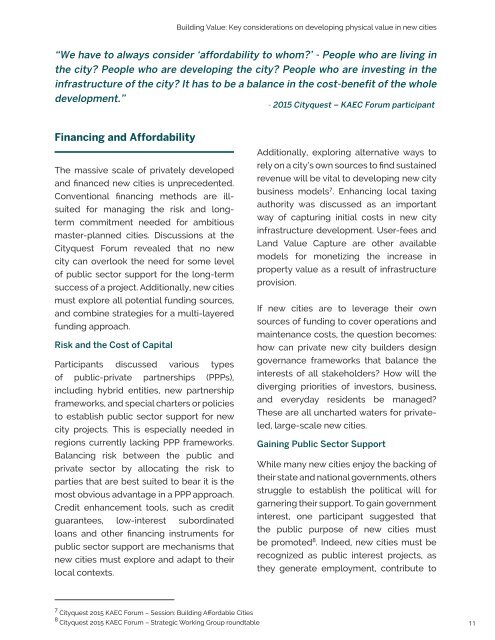New Cities and Concepts of Value
PDF-New-Cities-and-Concepts-of-Value-CityquestKAECForum2015
PDF-New-Cities-and-Concepts-of-Value-CityquestKAECForum2015
Create successful ePaper yourself
Turn your PDF publications into a flip-book with our unique Google optimized e-Paper software.
Building <strong>Value</strong>: Key considerations on developing physical value in new cities<br />
“We have to always consider ‘affordability to whom?’ - People who are living in<br />
the city? People who are developing the city? People who are investing in the<br />
infrastructure <strong>of</strong> the city? It has to be a balance in the cost-benefit <strong>of</strong> the whole<br />
development.”<br />
- 2015 Cityquest – KAEC Forum participant<br />
Financing <strong>and</strong> Affordability<br />
The massive scale <strong>of</strong> privately developed<br />
<strong>and</strong> financed new cities is unprecedented.<br />
Conventional financing methods are illsuited<br />
for managing the risk <strong>and</strong> longterm<br />
commitment needed for ambitious<br />
master-planned cities. Discussions at the<br />
Cityquest Forum revealed that no new<br />
city can overlook the need for some level<br />
<strong>of</strong> public sector support for the long-term<br />
success <strong>of</strong> a project. Additionally, new cities<br />
must explore all potential funding sources,<br />
<strong>and</strong> combine strategies for a multi-layered<br />
funding approach.<br />
Risk <strong>and</strong> the Cost <strong>of</strong> Capital<br />
Participants discussed various types<br />
<strong>of</strong> public-private partnerships (PPPs),<br />
including hybrid entities, new partnership<br />
frameworks, <strong>and</strong> special charters or policies<br />
to establish public sector support for new<br />
city projects. This is especially needed in<br />
regions currently lacking PPP frameworks.<br />
Balancing risk between the public <strong>and</strong><br />
private sector by allocating the risk to<br />
parties that are best suited to bear it is the<br />
most obvious advantage in a PPP approach.<br />
Credit enhancement tools, such as credit<br />
guarantees, low-interest subordinated<br />
loans <strong>and</strong> other financing instruments for<br />
public sector support are mechanisms that<br />
new cities must explore <strong>and</strong> adapt to their<br />
local contexts.<br />
Additionally, exploring alternative ways to<br />
rely on a city’s own sources to find sustained<br />
revenue will be vital to developing new city<br />
business models 7 . Enhancing local taxing<br />
authority was discussed as an important<br />
way <strong>of</strong> capturing initial costs in new city<br />
infrastructure development. User-fees <strong>and</strong><br />
L<strong>and</strong> <strong>Value</strong> Capture are other available<br />
models for monetizing the increase in<br />
property value as a result <strong>of</strong> infrastructure<br />
provision.<br />
If new cities are to leverage their own<br />
sources <strong>of</strong> funding to cover operations <strong>and</strong><br />
maintenance costs, the question becomes:<br />
how can private new city builders design<br />
governance frameworks that balance the<br />
interests <strong>of</strong> all stakeholders? How will the<br />
diverging priorities <strong>of</strong> investors, business,<br />
<strong>and</strong> everyday residents be managed?<br />
These are all uncharted waters for privateled,<br />
large-scale new cities.<br />
Gaining Public Sector Support<br />
While many new cities enjoy the backing <strong>of</strong><br />
their state <strong>and</strong> national governments, others<br />
struggle to establish the political will for<br />
garnering their support. To gain government<br />
interest, one participant suggested that<br />
the public purpose <strong>of</strong> new cities must<br />
be promoted 8 . Indeed, new cities must be<br />
recognized as public interest projects, as<br />
they generate employment, contribute to<br />
7 Cityquest 2015 KAEC Forum – Session: Building Affordable <strong>Cities</strong><br />
8 Cityquest 2015 KAEC Forum – Strategic Working Group roundtable<br />
11


